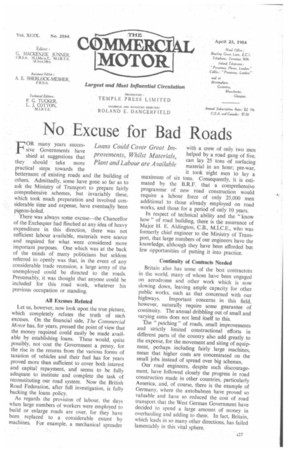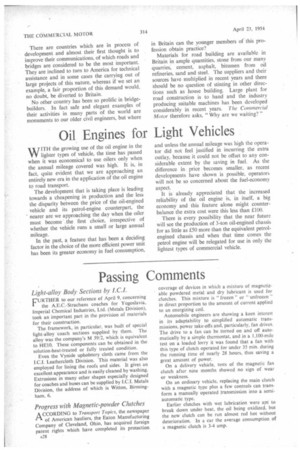No Excuse for Bad Roads
Page 29

Page 30

If you've noticed an error in this article please click here to report it so we can fix it.
FOR many years successive Governments have shied at suggestions that they should take more practical steps towards the betterment of existing roads and the building of others. Admittedly, some have gong so far as to ask the Ministry of Transport to prepare fairly comprehensive schemes, but invariably these, which took much preparation and involved considerable time and expense, have eventually been pigeon-holed.
There was always some excuse—the Chancellor of the Exchequer had flinched at any idea of heavy expenditure in this direction, there was not sufficient labour available, materials were scarce and required for what were considered more important purposes. One which was at the back of the minds of many politicians but seldom referred to openly was that, in the event of any considerable trade recession, a large army of the unemployed could be directed to the roads. Presumably, it was thought that anyone could be included for this road work, whatever his previous occupation or standing.
All Excuses Refuted Let us, however, now look upon the true picture, which completely refutes the truth of such excuses. On the financial side, The Commercial Motor has, for years. pressed the point of view that the money required could easily be made available by establishing loans. These would, quite possibly, not 'cost the Government a penny, for the rise in the returns from the various forms of taxation of vehicles and their fuel has for years proved more than sufficient to cover both interest and capital repayment, and seems to be fully adequate to institute and complete the task of reconstituting our road system. Now the British Road Federation, after full investigation, is fully backing the loans policy.
As regards the provision of labour, the days when large numbers of workers were employed to build or enlarge roads are over, for they have been replaced to a considerable extent by machines. For example, a mechanical spreader with a crew of only two men helped by a road gang of five, can lay. 25 tons of surfacing material in an hour; pre-war, it took eight men to lay a maximum of six tons. Consequently, it is estimated by the B.R.F. that a comprehensive programme of new road construction would require a labour force of only 25,000 men additional to those already employed on road works, and those for a period of only 10 years.
In respect of technical ability and the "know how" of road building, there is the assurance of Major H. E. Aldington, C.B., M.I.C.E., who was formerly chief engineer to the Ministry of Transport, that large numbers of our engineers have the knowledge, although they have been afforded but few opportunities of putting it into practice.
Continuity of Contracts Needed Britain also has some of the best contractors in the world, many of whom have been engaged on aerodrome and other work which is now slowing down, leaving ample capacity for other public works, such as that concerned with our highways. Important concerns in this field, however, naturally require some guarantee of continuity. The annual dribbling out of small and varying sums does not lend itself to this.
The " patching " of roads, small improvements and strictly limited constructional efforts in different parts of the country also add greatly to the expense, for the movement and siting of equipment, perhaps including fairly large machines, mean that higher costs are concentrated on the small jobs instead of spread over big schemes.
Our road engineers, despite such discouragement. have followed closely the progress in road construction made in other countries, particularly America, and, of course, there is the example of Germany, where the autobahnen have proved so valuable and have so reduced the cost of road transport that the West German Government have decided to spend a large amount of money in overhauling and adding to them. In fact, Britain. which leads in so many other directions, has failed lamentably in this vital sphere. There are countries which are in process of development and almost their first thought is to improve their communications, of which roads and bridges are considered to be the most important. They are inclined to turn to America for technical assistance and in some cases the carrying out of large projects of this nature, whereas if we set an example, a fair proportion of this demand would, no doubt, be diverted to Britain.
No other country has been so prolific in bridgebuilders. In fact safe and elegant examples of their activities in many parts of the world are monuments to our older civil engineers, but where in Britain can the younger members of this profession obtain practice?
Materials for road building are available in Britain in ample quantities, stone from our many quarries, cement, asphalt, bitumen from oil refineries, sand and steel. The suppliers and their sources have multiplied in recent years and there should be no question of stinting in other directions such as house building. Large plant for road construction is to hand and the industry producing suitable machines has been developed considerably in recent years. The Commercial Motor therefore asks, "Why are we waiting?"




















































































